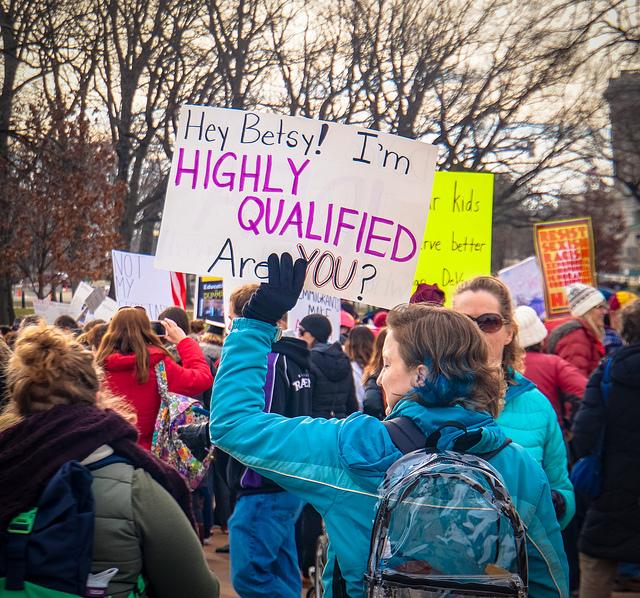By Noa Dalzell, political columnist
It was an undoubtedly tumultuous week in national politics. President Donald J. Trump stole the headlines when he imposed a discriminatory executive order barring the entrance of citizens from seven majority-Muslim countries for the next 90 days (Iran, Iraq, Yemen, Sudan, Somalia, Libya and Syria), stopping refugee admissions for the next 120 days and indefinitely banning all incoming Syrian refugees. The ban led to widespread backlash from foreign leaders, Democrats and even some Republicans. Tens of thousands of Americans rushed to protest in city centers and airports in response to reports that hundreds of individuals with visas and green cards had been detained across the nation’s airports. Acting Attorney General Sally Yates, who was appointed by former President Barack Obama, spoke out against this unconstitutional ban, spurring Trump to fire her.
As tensions heightened, Trump’s controversial cabinet nominations took a temporary backseat. But while the immigration order was undoubtedly earth-shattering, we must still pay attention to Trump’s appointment hearings and remain informed on their potentially adverse effects. Perhaps the most unqualified of Trump’s nominations is Betsy DeVos, the billionaire campaign donor who Trump chose to serve as Secretary of Education. DeVos, like other nominees I have profiled in past weeks, is extremely unqualified for the position and may have a pernicious effect on our country’s education system for several reasons.
-
Her lack of experience is astounding.
She has never held any type of office. DeVos has no experience managing a bureaucracy and large organization. She has also never worked as an educator, taken out a student loan or attended or enrolled her kids in the public school system. Instead, she has essentially served as a lobbyist, donating millions of dollars to Republican politicians to coerce them to support vouchers that give money to conservative religious schools rather than the public school system.
-
DeVos’s knowledge of the education system is insufficient.
Several times throughout her hearing, she revealed she did not understand basic concepts of the education system. When asked how school performance should be assessed, she could not distinguish between growth, which measures how much students have learned over a given period of time, and proficiency, which measures how many students reach a targeted score but not their improvement. DeVos was so poorly prepared for the hearing that several news outlets gave her a failing grade.
She may fail to protect disabled students.
DeVos questioned the notion that the federal government must ensure that any school receiving taxpayer dollars should comply with the law’s requirements for students with special needs. In a back-and-forth exchange with Sen. Tim Kaine (D-Va.), DeVos was asked about her stance on the Individuals with Disabilities Education Act (IDEA), which “ensures that all children with disabilities are entitled to a free appropriate public education to meet their unique needs and prepare them for further education, employment and independent living.”
In reference to IDEA, Devos responded, “I think that’s an issue best left to the states.” A shocked Kaine went on to explain this was an already-established federal law, to which DeVos responded she had been “confused.” While this exchange could support the notion DeVos is simply not knowledgeable in the country’s education, it is nonetheless highly concerning that she spoke about reversing IDEA, arguably the most important act in protecting the rights of disabled students.
-
Her focus on charter schools will negatively impact public education.
She advocates that the government divest money from the public school system and put it into private schools, where students are sometimes denied admission on the basis of gender or sexual identity, disability or behavioral problem. She is more than just a proponent of charter schools—even most charter school advocates have adjusted the mindset she continues to harbor. Her emphasis on charter schools and vouchers ignores the fact that the vast majority of students only have access to public education.
-
She normalizes pay-to-play politics.
“Do you think that if you were not a multibillionaire, if your family had not made hundreds of millions of dollars in contributions, that you would be sitting here today?”
It was a pointed question from Sen. Bernie Sanders (I-Vt.), and also the one Democrats were waiting for. Given her lack of experience and knowledge of the education system, many wondered what got her nominated, and it is certainly plausible to speculate that she was appointed as a political favor in return for years of donations. After all, the DeVos family has donated more than $950,000 to 21 GOP senators who will vote on her confirmation.
DeVos herself has admitted that she believes her continued financial contributions should be rewarded: “I have decided, however, to stop taking offense at the suggestion that we are buying influence,” DeVos once wrote. “Now I simply concede the point. They are right. We do expect something in return.”
The good news: Unlike for most of Trump’s nominations, there is a legitimate possibility she will not get enough votes for confirmation. Two Republican senators, Lisa Murkowski (R-Alaska) and Susan Collins (R-Maine), have already announced they will vote against her. If Senate Democrats hold their ground and unite against her, all it takes is one more Republican senator to vote against her to prevent her confirmation.
I urge readers who vote in Ohio to call Sen. Rob Portman (202-224-3353), who is reportedly on the fence about DeVos, and express your concerns. This is not a partisan issue or obstructionism, but a last-ditch effort to defend our public education system. Constituents have more of an influence on their representatives than they often believe. Murkowski said that “thousands” of her constituents’ active efforts and voiced concerns impacted her decision. In these times especially, it is important not to grow apathetic and passive but maintain active participation in our democracy.
Photo courtesy Ted Eytan, Creative Commons









